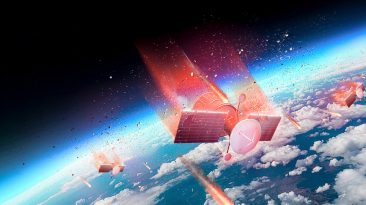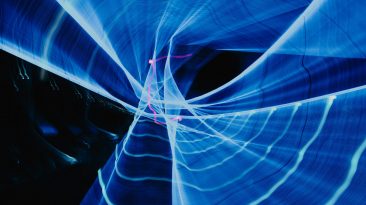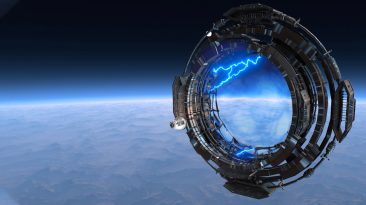Antimatter is the most potent fuel source known to humanity. And it could be the secret to faster-than-light space travel. But where in the Universe would we find antimatter? How fast could it make your spaceship travel? And why would you want to stock up on bananas on your intergalactic trip?
Every particle of matter created in the Big Bang has an equal and opposite particle of antimatter. Uh, theoretically. These antimatter particles have the same mass and lifetime as the regular matter particles. Only they have a different electric charge. And if antimatter ever came in contact with regular matter, there would be a big boom.
The particles would annihilate each other. And this would produce energy. Lots of it. This destruction of particles could be about 10 billion times more powerful than chemical combustion. Or around 1,000 times more powerful than nuclear fission. For a trip to Mars, you’d only need an amount of antimatter equal to about one one-thousandth of an M&M.
So let’s grab some and hit the road. But wait, where is it? Imagine you were aiming for the closest star system, Alpha Centauri. With current chemical-based fuels, that trip would take you about 30,000 years. Using a rocket propelled by antimatter, though, and you could really crank up the speed. You could zip through space at 116 million km/h (72 million mph).
Or, as some promising studies would suggest, maybe as fast as 72% the speed of light. That would make the journey to Alpha Centauri a mere six years. Ok, so what are you waiting for? If matter and antimatter particles were both created in our early Universe as a pair, finding it should be pretty simple, right? Well, think again.
Researchers have struggled to find much antimatter anywhere. But that doesn’t mean that producing our own antimatter would be completely out of the question. Scientists have observed antimatter production in CERN’s particle accelerator experiments and during thunderstorms. Even, wait for it, in one of your favorite fruits.
The energy density of antimatter is so high that you wouldn’t need very much in order to harness a lot of power. One gram (0.04 oz) would be as powerful as a nuclear bomb. Except that making this much antimatter would cost over one quadrillion dollars. So with a price tag like that, you shouldn’t be surprised to learn the amount of antimatter we’ve managed to produce at this point wouldn’t be enough to boil a cup of water, let alone get us into space.
And if we did manage to produce this antimatter, you’d face another challenge. Ordinary matter and antimatter need to be separated. Otherwise, they’d annihilate each other, remember? Your spaceship would need to be equipped with magnetic storage rings that would be able to keep the antimatter separate until it’s needed..
Then, you’d be able to redirect some of the antimatter to produce thrust. Alternatively, you could base your rocket on the antiparticles of electrons, called positrons. You’d just need to equip your ship with a source that continuously emits positrons as its isotopes decay, such as krypton. Once emitted, these positrons are hotter than the core of the Sun.
But if you could keep them cool while you extract them, you’d be on board one fast ship. A single loop around Earth would take just three seconds. And a trip to Mars would only take you a couple weeks. And should you ever run out of your krypton isotope source, your backup positron source would be no further away than the nearest fruit bowl. Yeah that’s right.
There’s antimatter in bananas. That’s bananas! Bananas contain small amounts of potassium-40, which is a naturally occurring isotope of, yeah you guessed it, potassium. As it decays, it produces one positron about every 75 minutes. No matter what source of antimatter you chose to use, there would be some significant dangers to keep an eye out for.
The reaction between matter and antimatter would produce enormous amounts of high-energy gamma radiation. This would be extremely dangerous and could damage your DNA. So you’d need to find a way to protect yourself from something that can penetrate almost anything. And you’d have to make sure the antimatter containment is never breached.
Maybe one or two positrons from a banana wouldn’t kill you. But the more reactions that occur, the more likely your own annihilation would become. You wouldn’t want to be the one responsible for accidentally detonating an antimatter bomb here on Earth, would you?
Sources
- “The Matter-Antimatter Asymmetry Problem”. 2022. home.cern.
- “What Is Antimatter?”. Adam Mann. 2021. livescience.com.
- “NASA – New And Improved Antimatter Spaceship For Mars Missions “. 2022. nasa.gov.
- “Antimatter Rocket Is A Future Spacecraft That Could Reach The Speed Of 72 Million Miles Per Hour”. Nickie Louise. 2021. techstartups.com.
- “POSITRON DYNAMICS”. 2022. positrondynamics.com.


























